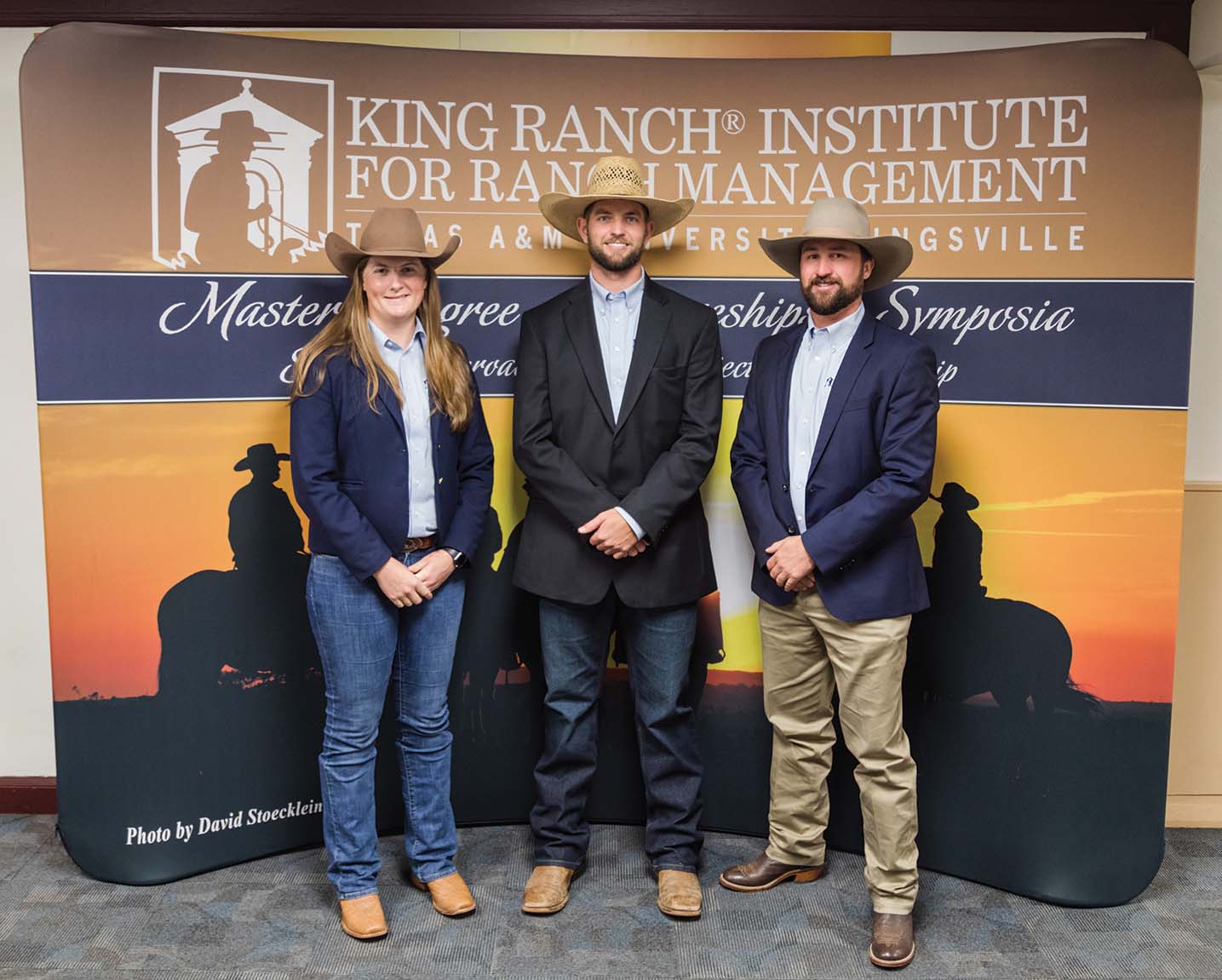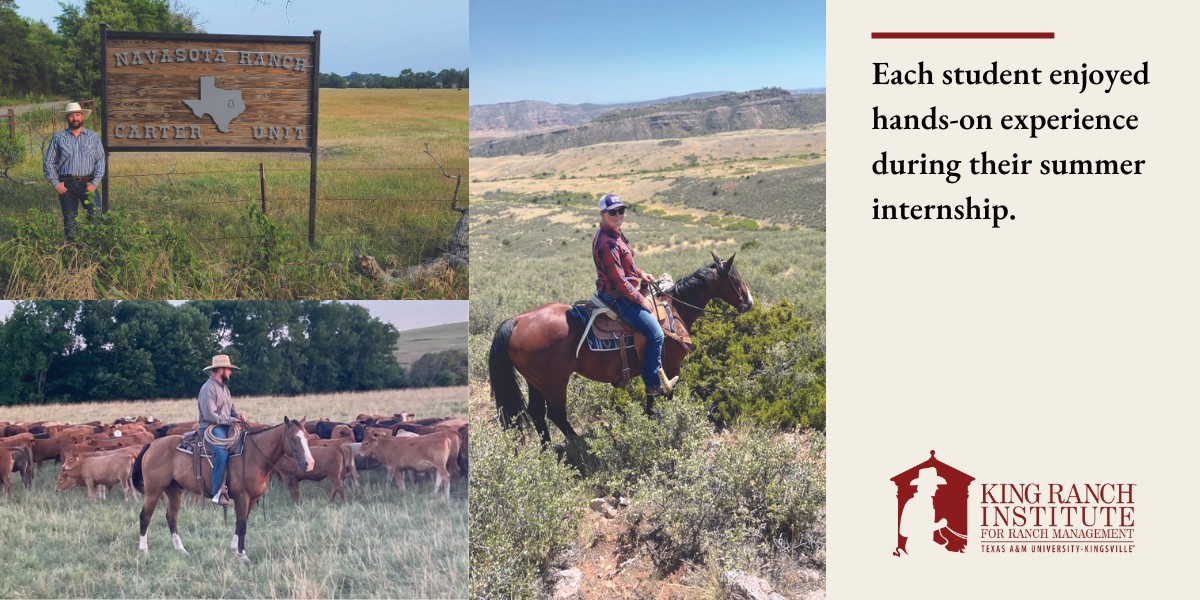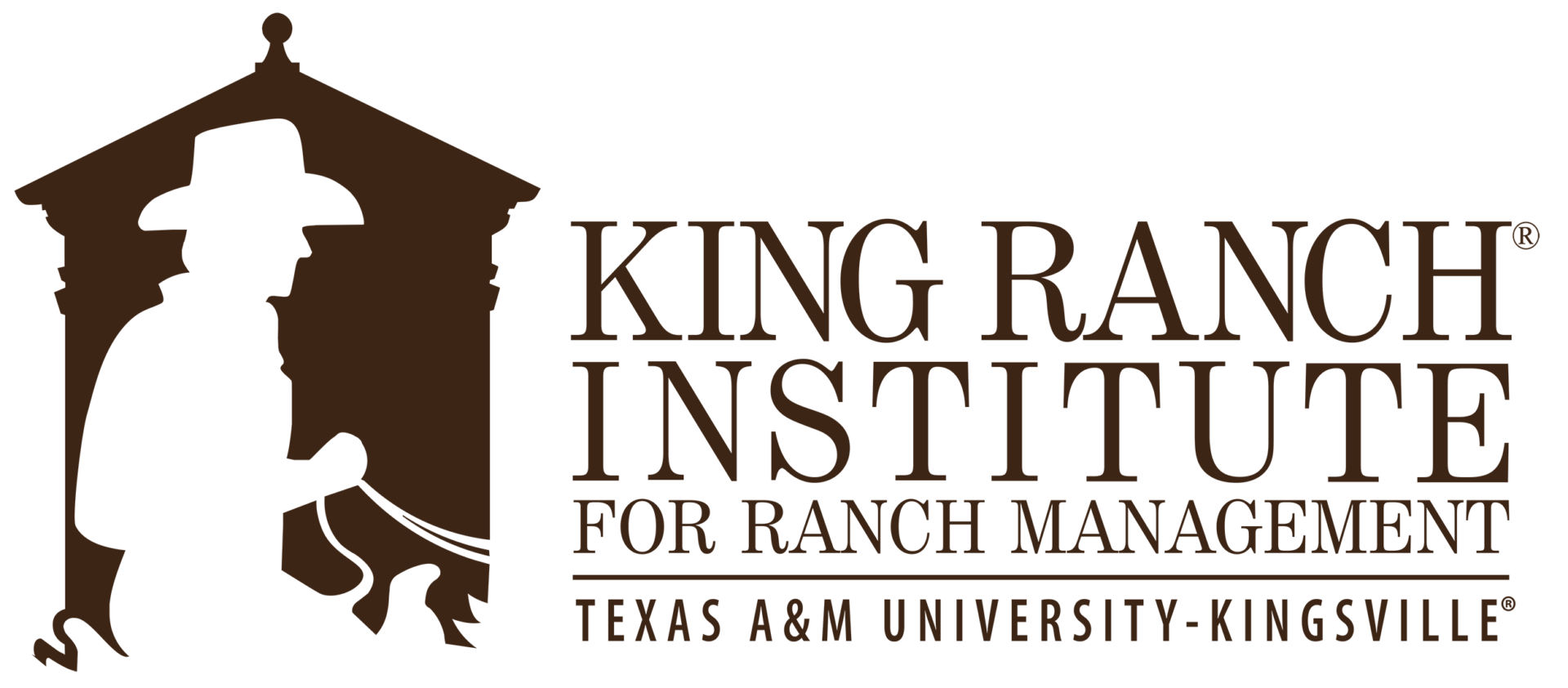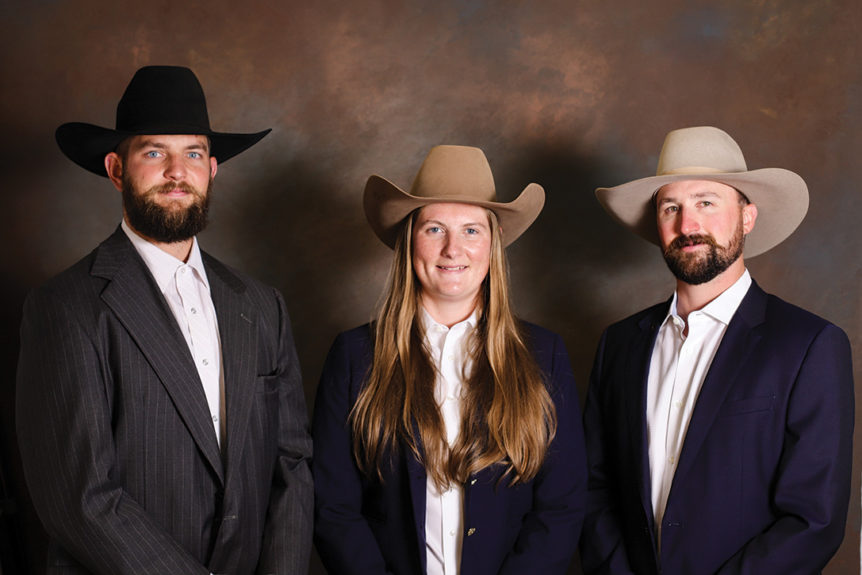The Class of 2023 is ready to apply their knowledge and experience to serve the ranching industry.
By Emily Stribling
Winter 2023 Newsletter
In May 2023, the next class of KRIRM graduates will earn their Master of Science in Ranch Management. The class of 2023 includes Bradley Donner, recipient of the Lee and Ramona Bass Endowed Fellowship; Caroline Wild, recipient of the Joe Marlin Hilliard Endowed Fellowship; and Tyler Woodland, recipient of the East Foundation Fellowship. These individuals will be joining the elite group of 50 other graduates who have earned this title over the past two decades.
When reflecting on his experience, Tyler Woodland states, “I have enjoyed the change in perspective that I have experienced while attending the Institute. It has been interesting to take a break from the stresses of work and focus on the bigger picture of the ranching industry.”
 KRIRM Class of 2023 at the 19th Annual Holt Cat Symposium (left to right):
KRIRM Class of 2023 at the 19th Annual Holt Cat Symposium (left to right):
Caroline Wild, Tyler Woodland and Bradley Donner
Applying Classroom Knowledge to Real-World Problems
Each year, incoming students are asked what skills they hope to gain or enhance during their time in the program. Almost unanimously, the students desire to improve their understanding of accounting and financial analysis. Caroline Wild recalled she was wanting to improve her understanding of enterprise analysis and managerial accounting noting, “Ranchers often have multiple revenue streams, and it is important to be able to confidently identify profitability and calculate key performance indicators.” Courses such as managerial accounting and managerial finance provide the opportunity to learn these skills, but what really drives home the concepts are the many real-world experiences students receive through projects and case studies. When asked what he enjoyed most about the program, Bradley Donner remarks, “The opportunity to consult on multiple projects for the largest and most complex ranches in the United States. This challenged me to participate in numerous multifaceted projects incorporating an array of disciplines allowing me to gain years of experience in a condensed timeframe.”
Networking Opportunities
All three students have appreciated learning from professionals within the industry whether it be during ranch visits, industry events or KRIRM lectureships/symposia. Wild says, “Even after hearing an explanation of the program’s structure, I was pleasantly surprised at the amount of interaction with industry experts, ranch managers and other professionals; that experience significantly sets the Institute apart from any other graduate programs I considered. The Institute gave me access to subjects and people I otherwise would not have had, unlocking many new opportunities.” Woodland appreciated the opportunity to discuss goals and challenges faced by current industry leaders across the country and says, “Networking with these professionals has been inspiring and enlightening.” He also notes skills such as financial analysis, strategic planning and leadership have all been enhanced, learning from fellow peers and professors as well.
 Internships
Internships
A highlight for every KRIRM student is the opportunity to intern with a partnering ranch to help solve real-world problems they are facing. Each of the students had unique experiences in parts of the country they had not previously worked.
Donner, a northern Colorado native, interned at Navasota Ranch in the Trinity River Basin near Oakwood, Texas. The ranch utilizes a high-intensity, short-term grazing system and was seeking a solution to a problem concerning the reliability and quality of their stockwater system. Donner was tasked with evaluating and designing a ranch-wide stockwater system to cost-effectively meet water demand and fulfill ownership goals. He says, “this process took significant modeling, logistics, financial analysis, and engineering to design a system that would help mitigate drought and progress the ranch towards optimization.” While he enjoyed the challenge of understanding the unique characteristics of ranching in an unfamiliar climate/geographical location, he also learned a lot about managing employees and the role they play in the success of the operation. He notes, “In order to be a successful leader, you need to cultivate followers who trust in your vision and skills.”
Wild, a Maine native, interned at Wagonhound Land and Livestock in Douglas, Wyoming. Her assignment was to identify and implement a commodity management system for their on-ranch feedlot. She remarks “It was one of the most educational (and fun) job experiences that I have had.” After researching different software systems, she purchased all the equipment needed to install the software, and created an in-depth how-to guide for them to use. It was a combination of a research and human resources project. Wild remarks, “Doing this project gave me the experience to see how systems thinking is useful on a working ranch.”
Woodland, who was raised in central Nevada, interned at Sooner Cattle Company near Pawhuska, Oklahoma, a subsidiary of AgReserves. The purpose of his project was to develop a financial baseline for each class of cattle in order to determine the marginal change in profitability if that class were run at full capacity. The result of his work is a model that can be utilized and adjusted in real-time for changing input factors. The model can also be adapted for different ranches within the AgReserves system. Woodland also had the opportunity to work with employees of different units helping with daily operations. “It was a wonderful group of people to work with,” remarks Woodland. “My internship afforded me the opportunity to see the impact of a good manager, not only on the profitability and sustainability of the ranch, but on the attitude of the employees as well.”
What’s next?
All three are eager to put their skills and knowledge to work within the industry.
When asked about future goals, Wild notes, “I hope to provide managerial accounting and data management services to ranchers and other agricultural producers so they can keep their businesses and livelihoods strong and continue to remain a vital part of the rural landscape.”
Woodland intends to apply the financial knowledge, people management skills, and business professionalism he has refined at the Institute in the ranch management arena to improve the quality and efficiency of ranch management. “I feel that traditional cowboy culture and ranching can be combined with innovative and regenerative practices to create a work environment that is appealing to employees and sustainable to the industry,” he remarks.
Similarly, Donner desires to “play a pivotal role on a dynamic and diversified ranching enterprise where I can apply my skills and knowledge leading a team to operational success while keeping true to the roots of traditional ranching by adopting innovations which have the potential to better the ranching community, land, animals and environment.”
Read the full newsletter here: Winter 2023 Newsletter

